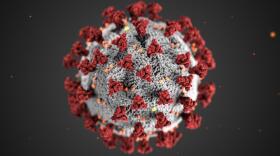The University of Maryland Baltimore dropped COVID-19 vaccination requirements for all of its faculty, staff and contractors who work on campus at the beginning of August. The move affects more than 10,000 individuals with ties to the college.
Several universities across the state have already adopted similar rules as students return to classes for the fall semester in the coming weeks. Employees who work in clinical settings must adhere to any requirements of the site, which includes COVID-19 vaccination at the University of Maryland Baltimore. Thousands of students attending the university are still required to show proof of COVID-19 vaccination or a qualifying exemption such as religious beliefs. Last fall the college had 7,200 students enrolled.
The COVID-19 positivity rate across Maryland is 11.46% compared to roughly 4% in August 2021, according to the Maryland Department of Health.
University of Maryland Baltimore officials were confident it was the right decision to drop the vaccination requirement since it already has an “extremely high vaccination rate” said Dr. Marianne Cloeren, public health officer for UMB. Beyond that, the campus has historically low employee turnover.
“The high levels of immunity, I think, made it less imperative to require vaccinations for everybody,” Cloeren said.
Masks have been optional for students, employees, faculty and visitors since March this year with the exception of individuals working in clinical settings.
Last year, all 12 schools across the University System of Maryland required COVID-19 vaccinations and boosters. As a result, the system achieved a vaccination rate of roughly 90%, according to the university system. But the University of Maryland main campus in College park is keeping its vaccination proof requirements this year. Each university across the state college system has the authority to make COVID-19 precautions and requirements.
Coppin State University and Towson State University declined to comment for this story. Coppin State went mask optional in March but required vaccinations for students on campus during the spring. Towson University no longer requires COVID-19 vaccines and masks are also optional. The University of Baltimore, dropped vaccine requirements and testing in June, but did not respond to requests for comment. Frostburg State University “strongly encourages” COVID-19 vaccines, according to its website but did not respond to further questions.
The employee union which represents workers at the University of Maryland, Baltimore and other employers, The American Federation of State, County and Municipal Employees has pushed for COVID-19 prevention measures during the pandemic. Before the university’s announcement, the union was unaware of any upcoming changes to work conditions.
Leaving the union out of the decision process is “seemingly another act of bad faith by one of the many administrations in the USM by not bargaining with workers about their health and safety,” said Stuart Katzenburg, director of collective bargaining and growth strategies for AFSCME council 3.
The University of Maryland Baltimore's public health officer said that understanding risk is key for any employee with health concerns or fears about workplace safety.
“I think it's more helping people understand the potential risk in different situations, so that people can make the best decision for themselves, based on their own personal risk and their own tolerance for risk,” Cloeren said.
But changing a public safety policy while transmission of COVID-19 is still happening worldwide is a risk, the union counters.
“We're seeing tons of our members at the universities in the state still getting sick and being obligated for their safety and the safety of others, to miss five to 10 days of work regularly,” Katzenburg said. “So to see them reduce one standard, but not increase other safety standards, or come to us to negotiate it is really disappointing.”
The vaccine requirements will remain for students because they must be vaccinated to participate in experiential learning experiences in the community and interact with individual patients.
“It just makes sense to make sure that the students are immunized, rather than trying to chase down each experiential learning requirement and seeing whether it's required at this clinical site or that clinical site,” Cloeren said.
Kate Tracy, Vice Chair For Research Services, Epidemiology & Public Health at University of Maryland School of Medicine, has advised the university system throughout the pandemic.
Tracy described USM’s response to COVID as “extraordinary” considering the variability with school mandates across the country.
“I think we're headed into the academic year in a position of strength in terms of how well protected against severe outcomes from COVID, our campus communities are,” Tracy said.
But this fall will be different as a new public health emergency is emerging with the spread of monkeypox. It is a virus that spreads between people. Symptoms may include a fever, body aches, chills, fatigue and potentially rashes and lesions. Most people recover within a month and don’t require hospitalization. There are already 219 cases of monkeypox across the state and vaccinations for the highest risk groups are underway. The University of Maryland has not had any confirmed cases of monkeypox on campus so far but sent a letter with recommendations to curb the spread of the virus.






